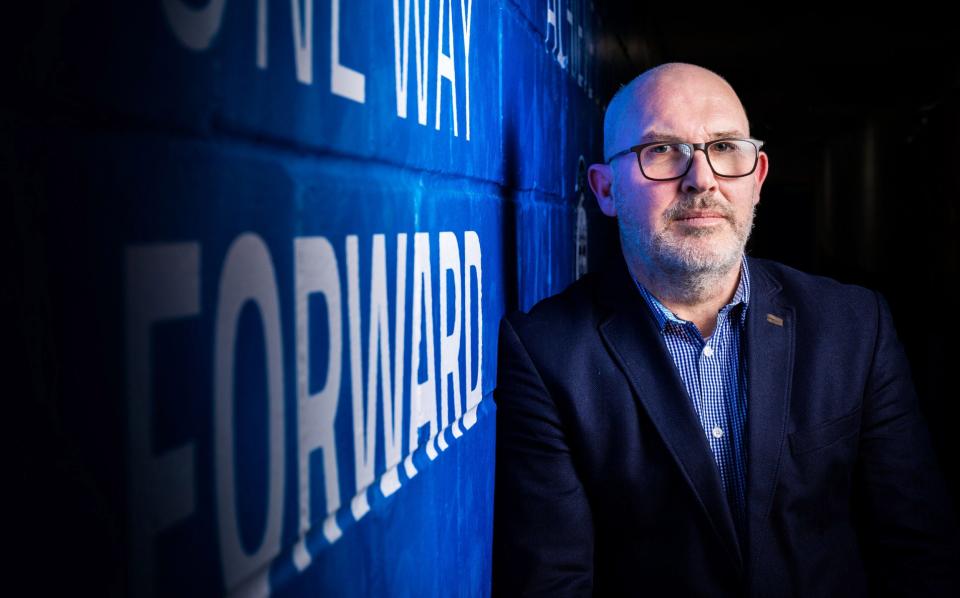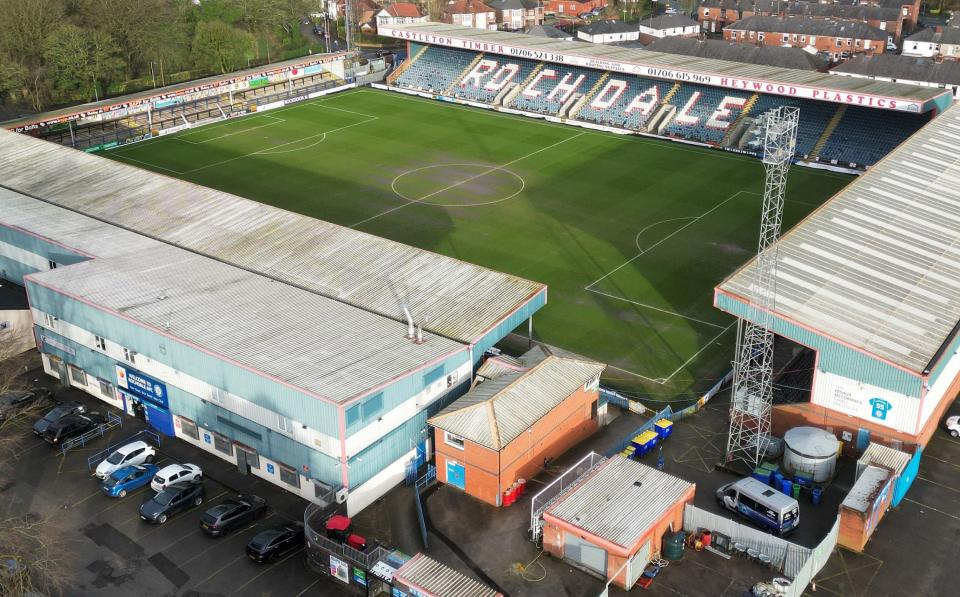“It’s unthinkable, yes, completely shocking,” says Rochdale’s chairman Simon Gauge, as he looks out onto their home pitch in Spotland and contemplates the possibility of the 117-year-old club ending its existence. “I think even when you look at it from the perspective of 15 guys over 60 who come here every Friday morning for two hours to play football and enjoy the social interaction some of them wouldn’t have otherwise. Even at that level the club needs to exist. It’s at the heart of the community.”
Without urgent investment, Rochdale faces liquidation by the end of the month. There are interested parties from the United States and Texas-based World Soccer Holdings has signed a letter of intent to purchase the club. But the fan-owned National League club could go bankrupt unless a decision is taken at an emergency shareholders’ meeting at Spotland on Thursday to create more favorable conditions for a £2m sale.
Gauge puts on a brave face, but these are dark times. “I will be sick to my stomach until we find a long-term investor and the future of the club is secured,” he said.
‘We are not a basket case’
The North West is full of chilling stories of clubs on the brink of collapse. From Bury, Bolton and Blackpool to Oldham, Stockport and Wigan, they were all suddenly on the verge of bankruptcy. Macclesfield Town have done just that and now operate in the Northern Premier League as Macclesfield FC.
Rochdale, by contrast, appeared to be progressing quite well. They had spent 36 consecutive seasons in England’s fourth tier until promotion to League One in 2010. To many this area became known as the “Rochdale section”. While some local competitors pursued a dream at great cost, often under abusive owners, Dale – as he was affectionately known in these parts – lived frugally and within his means. And in fact that seems to be the case right now. “Some of the teams you mentioned went out of business or went bankrupt and became basket cases because they spent much more than they earned,” Gauge says. “We are not a basket case. We’re still stable now, Eddie. “We ran out of cash.”


Without their own training base and facilities to rent or a wealthy benefactor, and without an obvious additional income stream, Rochdale tended to rely on player trading and the occasional Cup run to help bolster their cash balances. It has long been a delicate balancing act and they managed it relatively well until the double whammy of the Covid crisis and a very costly hostile takeover bid left the club in a tailspin. Two relegations in three seasons saw Rochdale withdraw from the Football League for the first time in over a century, hastening their decline and they are now fighting for their existence. “It was like the perfect storm for us,” Gauge says. “We’ve always kept our heads above water, but now we’re going underwater and can’t get up again.”
In fact, the town of Rochdale has had enough scandals in recent years without losing a valuable community asset like the football club loved by the 2,000 to 3,000 people who pass through its doors every week. From baby Awaab Ishak’s death from respiratory failure in a mold-filled house to a child sex abuse ring that triggered national outrage and ruined countless lives, Rochdale has lurched from one crisis to the next. The presence of so many tarnished candidates in last week’s Rochdale by-election, won by divisive MP George Galloway, seemed emblematic of a town in the throes of perpetual turmoil.
“These are all negative connotations,” says Gauge, anger etched across his face. “Deaths in social housing, grooming gangs, the by-election farce we are experiencing, these are all negative. I think at some stage the council and political leaders of this town need to address the issue. The football club is now the perfect springboard for them because of the publicity they can see it generating to start sending a positive message to the town.


The football club could certainly use a break or two and perhaps World Soccer Holdings could provide that. They were hoping to gain some breathing room in the January transfer window, with top clubs such as Crystal Palace and Southampton eyeing talented 18-year-old defender George Nevett. But then Everton and Nottingham Forest were accused by the Premier League of breaching their financial rules and suddenly Rochdale, to their misfortune, found potential suitors shying away and with that a potential £350,000 transfer fell through.
‘My children are not leaving because of abuse’
One of the sad and ironic aspects of Rochdale’s plight is that fans like Gauge fought so hard and at great personal cost, financially and emotionally, to keep the club out of the clutches of Morton House MGT during a year-long period of bitter hostilities . The takeover war and those who helped make it entirely fan owned were subjected to harassment from fellow fans at games. As a result, Gauge’s children stopped going to Spotland. “The kids loved to stop on Sandy Lane and watch the games,” Gauge explains. “But they won’t do that now because sometimes I get harassed and they get harassed by third parties, but the majority are not like that.”
Rochdale’s fan-owned status was born as much out of necessity as desire. Morton House was courted by Rochdale’s former chief executive David Bottomley, who was seeking external investment in the club and the payroll company had begun taking a stake in the club through private, independent deals with shareholders. None of the transactions completed individually were subject to EFL approval but as a whole they took Morton House above the 30 per cent threshold required to be subject to EFL owners’ and directors’ testing.
Rochdale fans, including the influential Dale Trust fan group, instinctively distrusted Morton House’s aims and took action fearing the club could go the way of Bury, who were expelled from the EFL in August 2019 due to predatory ownership. Former chairman Andrew Kelly was persuaded not to sell his 42 per cent stake in the club, resulting in a bitter ownership row that culminated in Morton House filing a claim in the High Court in July 2021. Morton House eventually reached an agreement 13 months later, agreeing to transfer its shares. To the Rochdale board for refusing to co-operate with an EFL investigation into attempts to buy the club. Bottomley was handed a two-year ban by the EFL in October 2022, along with Morton House representatives Andrew Curran and Darrell Rose. The fourth person, Faical Safouane, was suspended for 18 months. Rochdale received a six-point deduction, which suspended them for two years.
‘Time, money, stress’
Gauge and other shareholders spent around £500,000 to buy shares in Morton House; And the Dale Trust has done a remarkable job of crowdfunding to help cover some of the £500,000 legal bill. It couldn’t have been more poorly timed, following the financial blows caused by Covid and relegation from League One in 2021. “It probably cost us 15 months of time to find an investor,” Gauge says. “Time, money, stress. But we were just fighting for our lives. I don’t know how it would have turned out if the Morton House had received 51 percent of the vote. “I think the club could have left because they probably would have been deducted that many points and fined that much, I’m not sure how it would work.”
Much now depends on the outcome of Thursday’s EGM; If the relevant decisions are passed, it seems that only 10 percent of the club will remain in the ownership of the fans. “It’s a bit against the model that the fans have and the culture of the club,” Gauge says. “But we can’t survive unless we change.”